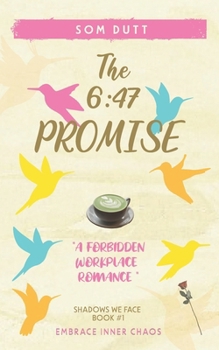The 6: 47 PROMISE: When Love Felt Like the Cruelest Betrayal
A dark contemporary romance with corporate thriller elements in the shadow of corporate corruption and family legacy
Every morning at 6:47 AM, Tristan Cross makes two cups of coffee in an empty break room. One for him. One for the ghost of his father, who died at this exact moment three years ago, crushed by a machine that should have been fixed.
He's hunting the man responsible: Harold Winters, the CEO who calls dead workers "acceptable losses."
He never expected to find Harold's daughter there, making her own ritual out of grief.
Wren Winters has been her father's captive audience since she was seven, memorizing murder plans discussed over pot roast, watching him destroy families between dessert courses. She keeps evidence hidden in teddy bears and recordings tucked in music boxes.
Until Tristan.
She knows which safety reports were buried. He knows which officials took bribes. But somewhere between shared grief and terrible coffee, they commit the unforgivable sin in Harold's kingdom: they fall in love.
When Wren hands him the key to her mother's storage unit packed with enough evidence to destroy an empire, she's not just risking discovery. She's choosing him over everything she's been taught to protect.
Harold Winters has been watching all along, letting them think they're clever. When he strikes, it's with surgical precision. Wren is six weeks pregnant when her father presents his ultimatum: publicly destroy Tristan with such cruelty he'll never come back, or watch him die in an accident. Brake lines are so unreliable, after all. Just ask her mother.
So Wren does what Harold trained her to do. She performs. In one devastating dinner, she convinces the man she loves that everything between them was a lie. That she chose money over love. That he was "adequate entertainment" but nothing more.
For 702 days, they exist in parallel grief. Tristan rebuilds in Chicago, saving other families from corporate predators while making coffee for ghosts. Wren raises their daughter in New York, married to a man who's gay and needs the cover as much as she does, teaching Hope to build bridges with blocks while her real father lives eight hundred miles away.
Hope knows Daddy is the "far away coffee man." She builds two separate block houses connected by bridges. She checks three times a night to make sure her parents haven't vanished. She organizes her Cheerios obsessively at two years old because that's what Daddy does with his coffee cups, even though she's never seen him do it.
When Harold dies and Tristan returns, they discover that freedom can be harder than captivity. They're in the same house but might as well be in different countries. They protect each other from happiness like it's another threat.
Through Hope's perspective (her meltdowns about pancake shapes, her desperate need for "together-practice," her innocent wisdom that "blocks don't break from touching") we see two people who fought so hard to be together they forgot how to actually do it.
As Harold's accomplices close in and his final letter threatens to detonate their fragile peace, this family faces the hardest truth of all: sometimes the war ends, but the soldiers forget how to stop fighting. Sometimes a two-year-old has to teach her parents that love isn't just about sacrifice. It's about showing up for pancakes, even when they're the wrong shape.
It's a story about how we inherit our parents' wounds and decide whether to pass them on. About choosing joy as an act of rebellion. About learning that "together" is a verb that requires daily practice, especially when you've spent so long practicing "apart."
Main Trope: Star-crossed lovers/Forbidden romance between the daughter of a corporate villain and the son of his victim





